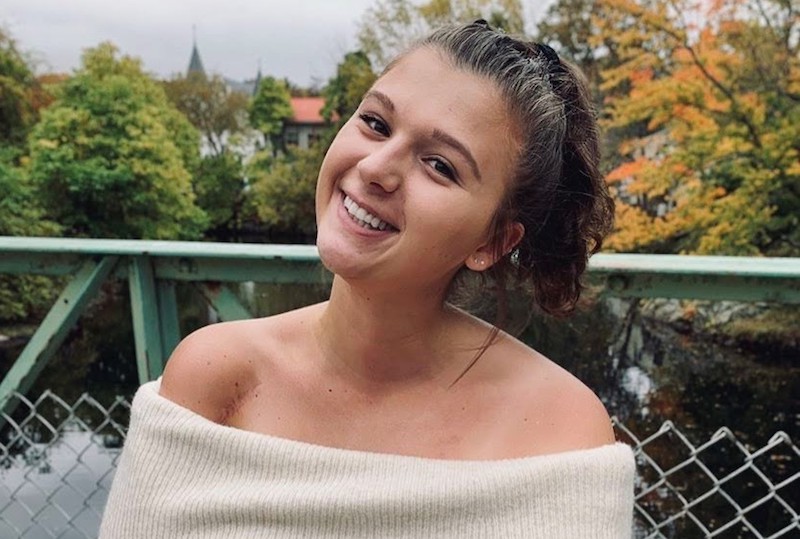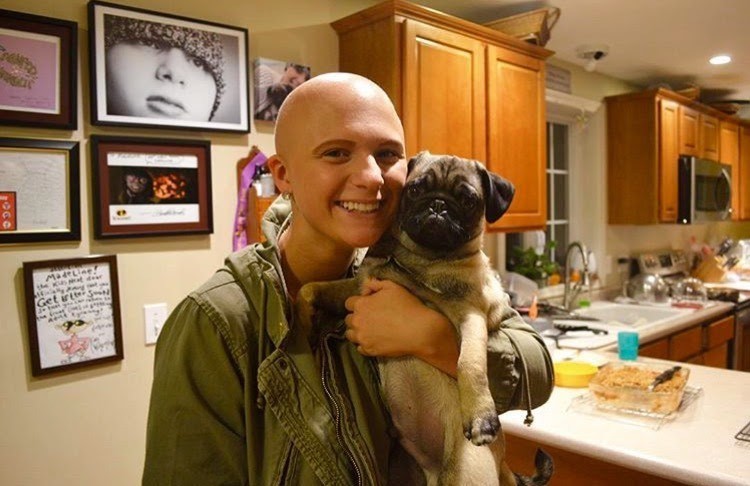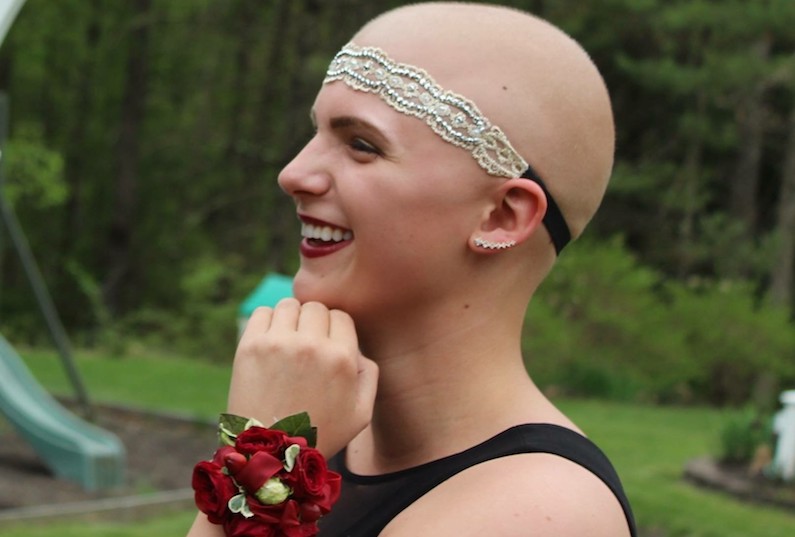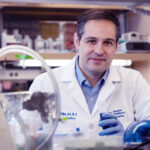While enjoying college, Ewing sarcoma survivor looks to her past

It lacks sunsets and skylines, but Maddie Carlson loves the view from her dorm room at Emmanuel College in Boston. If the 20-year-old junior sticks her head out the window at just the right angle, she can almost make out a portion of the place she credits for saving her life after she was diagnosed with Ewing sarcoma — a rare, often-deadly cancer that grows in the bones and soft tissue.
A comforting reminder
“I can’t really see it, but I know it’s there,” says Maddie. “That’s a good feeling.”
The object of her admiration is Dana-Farber/Boston Children’s Cancer and Blood Disorders Center, located just a few blocks from Emmanuel’s campus. It was a clinical trial of immunotherapy, conducted at Dana-Farber/Boston Children’s, that knocked Maddie’s cancer into remission after two relapses in three years. She started her fall 2019 semester disease-free for 17 months and counting, and is enjoying a life filled with classes, friends, and two part- time jobs.
“One of my jobs is as a residence assistant, helping connect students on my floor with resources on campus,” says Maddie. Then she laughs. “After what I’ve been through, I’m pretty good at helping others find what they need.”

Maddie’s training for this role started just a week after she turned 16, in May 2015. A pain in her right arm, which had been bothering her off and on for a month, grew so bad that her mother rushed her to an emergency room (ER) near their home outside Manchester, New Hampshire. An x-ray and MRI found the source of her pain: a tumor in her humerus.
“Right away, the ER doc told us we had go to the Jimmy Fund Clinic at Dana-Farber/Boston Children’s,” Maddie remembers. “They said it was the best place in the world.”
Trials and tribulations
Once further testing in the Jimmy Fund Clinic confirmed her cancer as Ewing sarcoma, Maddie tapped into the experts in Dana-Farber/Boston Children’s Bone and Soft Tissue Tumors Program. She was put on a clinical trial for four months, followed by surgery in August 2015 to remove the tumor. Because her tumor continued growing during the pre-surgical period, she was put on a different treatment after the surgery — along with receiving radiation treatment.
Dr. Lillian (Lily) Guenther, Maddie’s primary oncologist, formed a special bond with the teenager during this challenging period.
“Maddie is a truly remarkable young woman,” says Dr. Guenther. “She was faced as a teenager with an aggressive cancer that challenged her medical team with its resistance to multiple therapies. Despite this, she never stopped advocating for herself and seeking alternative treatment options. The access to so many cutting-edge clinical trials at Dana-Farber/Boston Children’s has allowed Maddie and others like her to carry on with life as usual.”
Maddie attended high school throughout her treatment, receiving infusions at home when necessary, and was just a few days from starting college in August 2017 when she learned that the cancer had returned after a year’s remission: this time in her lungs. Patient and doctor had grown so close that they were now on a first-name basis, and Maddie requested Dr. Guenther.
“I told Lily I really wanted to start college without having to lose my hair or wear a port-a-cath for chemotherapy, so she put me on oral chemo,” says Maddie. “Unfortunately, like the first couple treatments we tried, it didn’t work.”
Using immunotherapy to fight cancer
When the nodules in Maddie’s lungs continued to grow, Dr. Guenther tapped into the resources of her colleague Dr. Steven DuBois. As director of the Experimental Therapeutics at Dana-Farber/Boston Children’s, he works with basic scientists to find new therapies for solid tumors like Ewing sarcoma and neuroblastoma that predominantly affect children and young adults. One of the novel treatments he and his team offered Maddie in 2017 involved using immunotherapy — a treatment that uses the patient’s immune system to fight cancer — in clinical trials for metastatic Ewing sarcoma patients.

That was perfect timing for Maddie, who joined an immunotherapy trial offered by Dr. DuBois that fall, testing the effects of nivolumab and ipilimumab in patients with Ewing sarcoma and other pediatric solid tumors. And although she was hospitalized for gastritis (a side effect of immunotherapy) for four months during her treatment, the cancer disappeared again. This time it has stayed away.
Out of sight — but never out of mind
It is fitting, Maddie says, that she can’t quite see the cancer center where she spent so much time. She knows she will need continued monitoring, both for another recurrence or other side-effects. But her long remission has resulted in fewer check-ups; her visits with Dr. Guenther have gone from once monthly to every three months to twice a year. If the news stays good, they will soon become an annual occurrence.
“I love seeing Lily and everybody at the clinic — they are kind of like my security blanket — but I know it’s a good thing I’m not going there much now,” says Maddie, who is majoring in psychology and considering a career in pediatric healthcare. “I’ve never experienced dedication like that which was given me at Dana-Farber/Boston Children’s. They never gave up on me, and never said ‘there is nothing else we can do.’ That gives me confidence I can take moving forward, whatever I do.”
Learn more about the Dana-Farber/Boston Children’s Bone and Soft Tissue Tumors Program.
Related Posts :
-

A true hero’s journey: How a team approach helped Wolfie overcome pancreatitis
Wolfgang, affectionately known as “Wolfie,” is a bright and energetic 7-year-old with a quick wit and a love for making ...
-

A case for Kennedy — and for rapid genomic testing in every NICU
Kennedy was born in August 2025 after what her parents, John and Diana, describe as an uneventful pregnancy. Soon after delivery, ...
-

The journey to a treatment for hereditary spastic paraplegia
In 2016, Darius Ebrahimi-Fakhari, MD, PhD, then a neurology fellow at Boston Children’s Hospital, met two little girls with spasticity ...
-

A toast to BRD4: How acidity changes the immune response
It started with wine. Or more precisely, a conversation about it. "My colleagues and I were talking about how some ...





